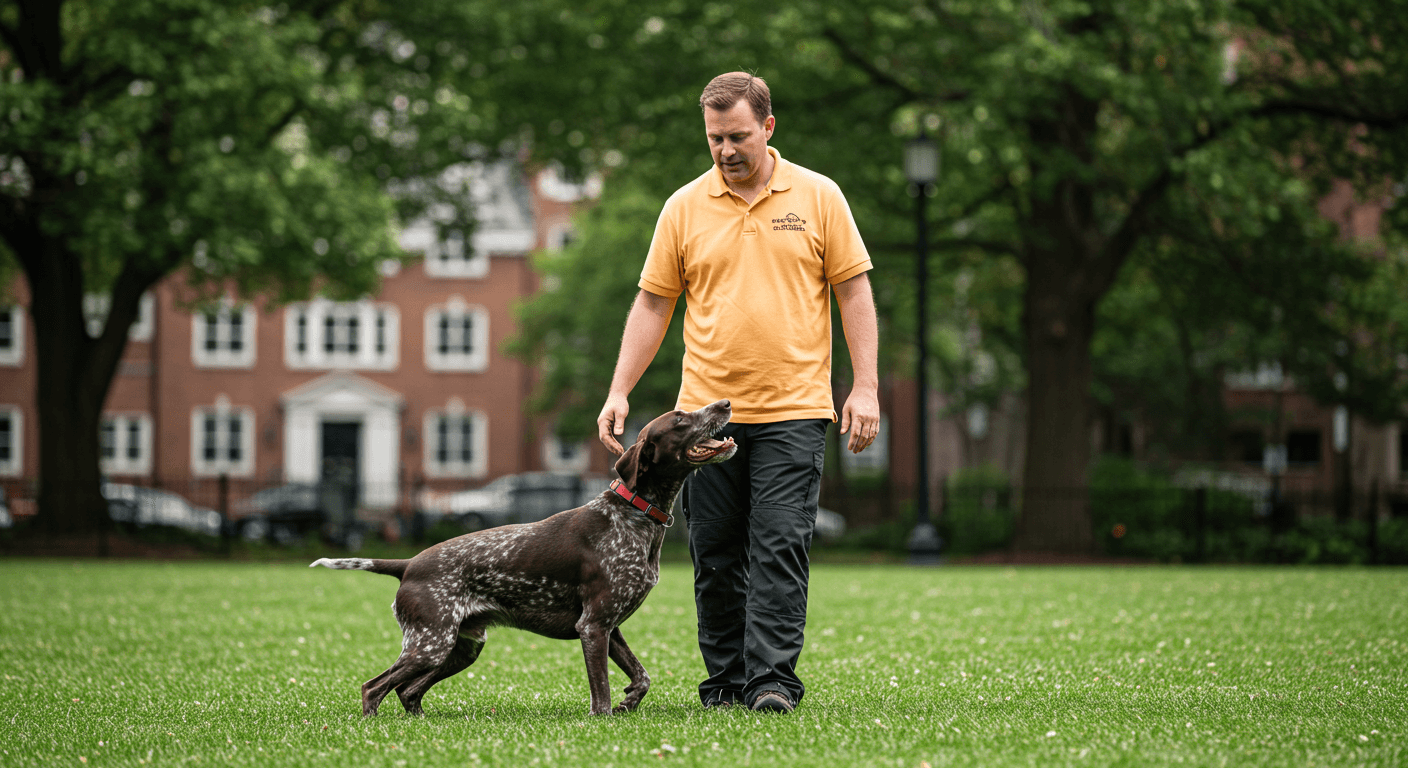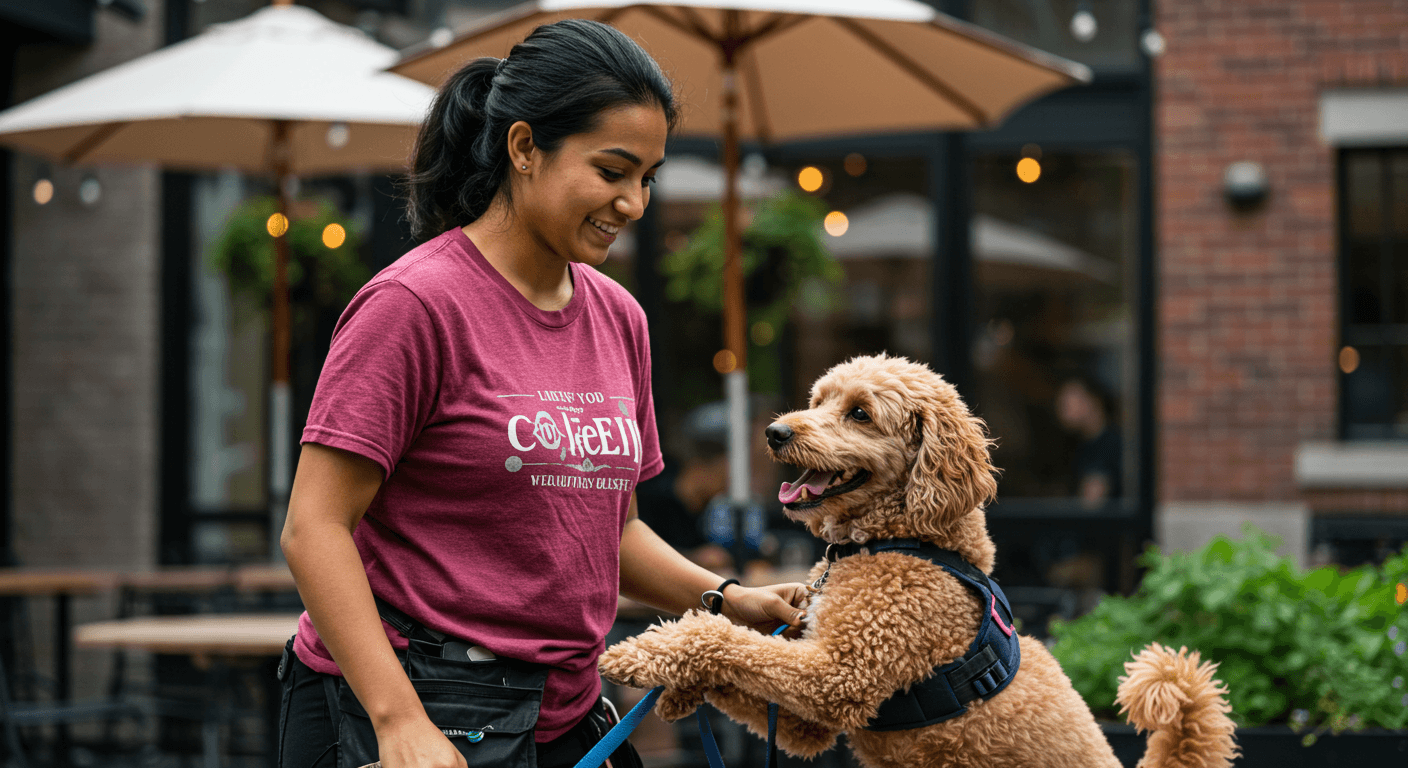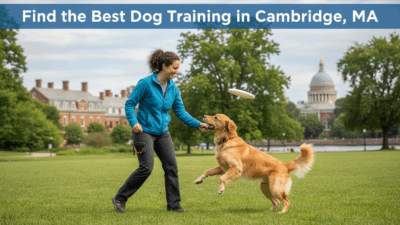Your Complete Guide to Choosing a Dog Trainer in Cambridge MA and Surrounding Areas
Living with a dog in Cambridge means navigating tight sidewalks, busy Harvard Square, crowded T stops, and lots of other dogs in small spaces. Your dog needs to stay calm when passing cafes along Massachusetts Avenue, handle the chaos near Central Square, and walk politely through neighborhoods like Cambridgeport and East Cambridge without lunging at every person or bike that passes.
Cambridge sits in Middlesex County, and most local rules follow city ordinances that reflect the dense urban environment. When you find a trainer who understands these challenges, you’ll get better results both at home and out in your neighborhood.
How to Choose the Right Trainer
Start by looking for someone who uses positive reinforcement training and can set realistic goals for city living. This means your dog should learn to walk calmly on crowded sidewalks, stay focused near outdoor dining areas, and handle apartment hallways without barking at neighbors.
Credentials give you a quick way to compare professional dog trainers’ experience levels. Common dog trainer certifications include KPA-CTP, CPDT-KA, or IAABC-CDBC for behavior problems. If your dog has serious aggression or reactivity issues, look for someone with CBCC-KA or a science-based program like CTC.
In-home dog training works great for puppy training, door manners, and building good habits in your apartment or condo. Group classes make sense once your dog can focus around distractions, especially before you try busy spots like the Charles River paths or Fresh Pond.
Common Dog Training Methods Explained

Reward-based methods build the trust you want while creating lasting behavior changes. They also help you follow Cambridge’s strict rules about keeping dogs under control in public spaces.
Basic obedience covers sit, down, stay, place, recall, and leash training so your dog can handle walks, outdoor seating areas, and park visits without pulling or jumping on people. These skills matter even more when you’re sharing narrow sidewalks with strollers and bikes.
Puppy classes focus on socialization, potty training, bite control, crate comfort, and early leash work. Starting with short, positive training sessions prevents bad habits from forming, which is especially important in apartments where sound travels.
Behavior modification addresses fear, reactivity, resource guarding, or separation anxiety through careful desensitization and counterconditioning. For serious cases, ask if your trainer works with local veterinarians who understand behavior.
Private lessons and in-home sessions let you customize everything around your daily routines and specific challenges like stairwell reactivity or elevator manners. Day training can speed up results when you’re juggling long work hours.
Dog training classes help your dog practice good manners around other dogs and people. The best classes give dogs plenty of space, screen participants carefully, and teach calm behavior rather than just excitement.
Specialized training like therapy dog training or service dog training requires extra structure, public-access skills, and a very clear step-by-step program. Cambridge’s environment offers plenty of real-world practice opportunities once your dog is ready.
Stay away from trainers who use fear, intimidation, or pain to get results. Humane methods are safer for everyone, easier to maintain long-term, and much better for keeping peace in close quarters with neighbors.
Average Cost of Dog Training in Cambridge MA (Updated for 2025)
Prices around Cambridge and Middlesex County tend to run higher than state averages due to the urban location and cost of doing business. Here’s what most local dog owners are paying in 2025.
| Service Type | Average Cost (Cambridge/Middlesex County) |
|---|---|
| Puppy classes (4-6 weeks) | $200-$350 total |
| Group obedience classes (4-6 weeks) | $225-$400 total |
| Private lessons (60-90 min) | $150-$250 per session |
| In-home coaching packages (4-6 visits) | $600-$1,200 total |
| Day training (trainer works your dog + handoff) | $600-$1,200 per week |
| Behavior consult for reactivity/anxiety (initial) | $200-$350 |
| Board and train (2-4 weeks) | $2,500-$5,500 total |
You’ll probably pay premium rates for trainers who specialize in urban behavior problems or who travel within Cambridge proper. Expect higher rates for complex behavior modification work.
Make sure you understand what’s included, how the trainer tracks progress, and whether they offer a free consultation or free evaluation before you sign up.
Questions to Ask a Potential Dog Trainer
- What training methods do you use, and how do you keep training sessions positive and low-stress?
- What credentials do you have, like KPA-CTP or CPDT-KA? Do you keep up with continuing education such as CPDT-KSA?
- How will you customize the training program for my dog’s specific needs and Cambridge’s urban environment?
- Do you have experience with apartment dogs and common city challenges like elevator reactivity and crowded sidewalks?
- Do you offer in-home visits, dog training classes, or day training, and which approach fits my goals best?
- How will we measure my dog’s progress and know when to add more distractions?
- What are the total costs, including any travel fees, and what’s your cancellation policy?
- Do you carry liability insurance, and can you show me proof?
- For behavior problems, will you work with my veterinarian if needed?
- What should I practice between our sessions to help your dog keep improving?
Local Cambridge Rules and Considerations
Cambridge enforces strict leash laws and nuisance rules that reflect the city’s density. Massachusetts state law also sets requirements for rabies vaccination and animal control.
Leashes are required in all public spaces except inside designated off-leash areas. You must use a leash no longer than 8 feet according to Cambridge city ordinance, and your dog must be under your control at all times. This matters especially on busy streets near Harvard Square, Porter Square, and along the Esplanade.
Massachusetts law requires current rabies vaccination for all dogs over 6 months old. You’ll need to register your dog with the City of Cambridge Animal Commission and display the city dog license tag on your dog’s collar.
Excessive barking can be considered a nuisance under Cambridge noise ordinances, so work with your trainer on alert barking and separation anxiety before neighbors file complaints. In triple-deckers and apartment buildings, sound carries easily between units.
Massachusetts doesn’t require special licenses for dog trainers, but reputable trainers carry liability insurance. If a business boards dogs for payment, they need to follow state kennel regulations through the Massachusetts Department of Agricultural Resources.
The Cambridge Animal Commission oversees dog licensing, bite reports, and animal control issues. You can find licensing information and local resources on their website.
Local Cambridge Resources for Dog Owners
These spots give you great places to practice polite manners, work on recalls, and provide safe enrichment for your dog. Always follow the posted rules and etiquette guidelines.
- Danehy Park Dog Park offers a fenced off-leash area where you can practice recalls and calm greetings during quieter times of day
- Fresh Pond Reservation allows leashed dogs on the perimeter trail and provides excellent opportunities to build focus around joggers, cyclists, and wildlife
- Magazine Beach off-leash area in Cambridge permits dogs to run free before 8 AM and after 6 PM during warmer months, perfect for recall practice with time restrictions

FAQs
How much does in-home dog training cost?
Most Cambridge trainers charge $150-$250 per in-home visit, with discounts available when you buy packages. Behavior problems and reactivity work typically start at the higher end of that range.
Is in-home dog training worth it?
Absolutely, because you’re working on problems exactly where they happen. Your trainer can fix door manners, jumping on guests, hallway reactivity, and elevator anxiety right where you live, then step outside to practice leash skills on your actual neighborhood sidewalks.
Can you pay someone to house train your dog?
Yes, many trainers offer puppy programs that include potty training, crate routines, and daily schedules. Day training can speed up the process while teaching you how to maintain the progress, which is especially helpful in apartments.
What is the 3-3-3 rule for dog training?
This is a helpful timeline for new or adopted dogs: expect about 3 days for your dog to decompress, 3 weeks to learn your routines, and 3 months to feel completely settled. Good training programs work with this natural adjustment period.
How long will it take to reach my training goals?
Most puppies and friendly adult dogs show solid progress within 4-8 weeks if you practice daily. Fear, reactivity, or aggression typically requires several months of careful behavior modification with gradual increases in difficulty.
What should I bring to group classes?
Pack a flat collar or harness, a 6-foot leash, high-value treats, water, and current vaccination records if your trainer requests them. Leave retractable leashes at home for safety reasons.
What’s the leash law in Cambridge?
Cambridge requires all dogs to be leashed with a leash no longer than 8 feet in all public areas, except inside designated off-leash spaces. Your dog must remain under your control at all times, and you can face fines for violations.
Do I need a dog license in Cambridge or Middlesex County?
Yes, Cambridge requires all dogs over 6 months old to be licensed through the Cambridge Animal Commission. You’ll need proof of current rabies vaccination to get your license, and the tag must be displayed on your dog’s collar at all times.
What shots does my dog need in Middlesex County or Massachusetts?
Massachusetts law requires rabies vaccination for all dogs over 6 months old. Your veterinarian may also recommend distemper-parvo, bordetella, leptospirosis, and Lyme disease vaccines based on your dog’s lifestyle and exposure risks.
Are dog trainers required to be licensed in Cambridge or Middlesex County or Massachusetts?
No special trainer licenses exist in Massachusetts. Expert dog trainers follow normal business regulations, but if they offer board and train services, their facility may need to comply with state kennel regulations through the Department of Agricultural Resources.
Where can I practice off-leash recall?
Use Danehy Park Dog Park or the early morning and evening hours at Magazine Beach when off-leash access is permitted. These fenced or time-restricted areas keep things safe and legal while you build reliable recalls.
Which dog parks allow training around Cambridge?
Danehy Park Dog Park welcomes dogs within its fenced area during posted hours. Magazine Beach allows off-leash access before 8 AM and after 6 PM seasonally. Both spots work well for practicing socialization and obedience training when you visit during quieter periods.
What beaches or trails allow dogs for training?
Fresh Pond Reservation welcomes leashed dogs on the 2.25-mile perimeter trail, perfect for building focus around joggers and cyclists. The Charles River paths through Cambridge allow leashed dogs and offer great urban training environments. For beach access, you’ll need to travel outside the city, but these local trails provide excellent training opportunities.
How do I handle apartment training challenges?
Work with a certified dog trainer who understands urban living and can address specific issues like hallway reactivity, elevator anxiety, stairwell barking, and neighbor noise concerns. Training for dogs in apartments requires different strategies than suburban training.
What if my dog is reactive on Cambridge sidewalks?
Reactivity is common in dense urban environments where dogs encounter constant triggers. A professional who specializes in behavior modification can help your dog learn to stay calm around other dogs, bikes, strollers, and crowds through systematic desensitization and positive reinforcement training.
The right combination of thoughtful planning, humane methods, and consistent practice around Cambridge’s streets and parks will help your dog become a confident, well-behaved dog. If credentials matter to you, don’t hesitate to ask about dog trainer certifications and how your trainer stays current with new techniques. Whether you live in North Cambridge, Inman Square, or along the river, dog training services exist to help your dog thrive in this busy city.
